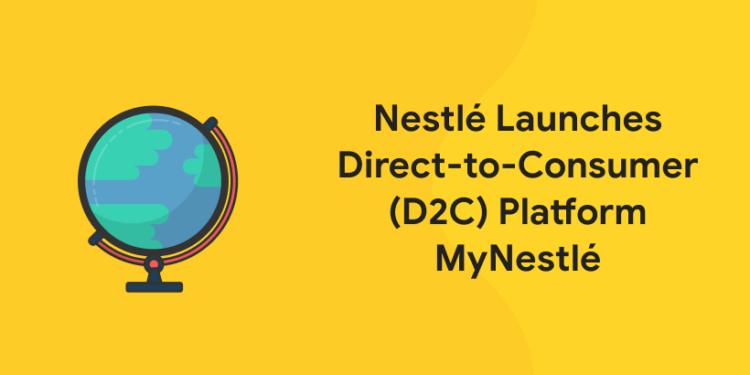Nestle India has launched its first ‘Direct to Consumer’ (D2C) platform, MyNestle, signifying the company’s significant entry into the fast-growing D2C industry, where heritage FMCG giants such as HUL, ITC, and Marico have previously launched their services. Additionally, Nestle released its third-quarter statistics, reporting the strongest quarterly sales growth in the previous five years.
“I am delighted to announce the introduction of our first-ever D2C platform, www.mynestle.in, to serve our valued consumers when and where it counts,” Suresh Narayanan, chairman and managing director of Nestlé India, stated in a news release.
Attempt Free General Knowledge Mock test! Download Entri App!
“This achievement has been on persistent strong volumes and compounded growth with broad based double digit growth across all categories,” stated Suresh Narayanan, Chairman and Managing Director of Nestle India, in response to the results.
According to him, growth has been quite robust in major metropolitan areas and large cities, and it is still strong in rural and small-town markets.
This is a reflection of the consumer’s love and trust for our brands, of my team’s and our partners’ everlasting dedication, and of the organization’s tenacity in making sure that not just our products but also our ‘product services’ are pertinent to customers all over India. attainable,” he continued.
On its platform, the business intends to provide curated product bundles, custom gifts, discounts, and subscriptions. On the platform, customers may test out gourmet meals and receive free nutrition advice. MyNestlé will debut in Delhi NCR first before moving on to other regions of the nation. Nestlé India has joined the group of companies, such as Hindustan Unilever, ITC, Marico, Emami, etc., that have already introduced their D2C platforms in the Indian market with this statement.
The development of several new-age businesses, including Mamaearth, Plum Goodness, and Licious, has forced FMCG majors to improve their direct-to-consumer (D2C) game. These businesses, which have recently grown significantly by connecting with customers through e-commerce rather than through more conventional channels like distributors and retailers, attain a large market share. In addition to developing D2C platforms, the corporations also introduce products designed especially for their D2C channels or even brands that are only available online. In order to compete with digital-first brands, players including Dabur, Marico, Emami, and Tata Consumer Items are releasing products specifically for their D2C platforms and marketplaces. For instance, Dabur India plans to generate Rs 100 crore in revenue from its brands in FY23.
Prepare for General Knowledge Exam! Download Entri App!
The introduction of the D2C platform is anticipated to increase sales for Nestle India through the e-commerce channel, which presently accounts for around 7% of its domestic sales.
According to Amnish Aggarwal, head of research at Prabhudas Lilladher, “Launch of D2C platform – www.mynestle.in would further increase digital sales contribution over the medium term.”
Narayanan stated, “There are reasons why I was “optimistic” about Nestle’s prospects in India. She observed outstanding ongoing business performance with the senior leadership team, a lively, young, and motivated staff, the equity of our brands, and our significant community and social footprint during the visit of Nestle SA’s Global Board of Directors to India.
The digital revolution in India and “how we are part of it and not just for India but also for Nestle in India” were highlighted by Nestle as examples of our commitment to environmental sustainability. The direction of investment focus and faster business growth in India has received significant approval from Nestle’s global board.
Nestle India recorded a net profit of Rs 668 crore for the third quarter ending in September (Q3), an increase of 8.3% year over year (YoY) from the Rs 617 crore reported in the same quarter last year. In comparison to Q3 of last year, the company’s overall period revenues climbed 18.3 percent to Rs 4,591 crore from Rs 3,882 crore. Sequentially, the company’s net profit increased by about 30% from Rs 515 crore reported in Q2 to Rs 4,036 crore in the June quarter, while revenue increased by 14%.
Analysts have given the company’s performance a thumbs up. In a report, Edelweiss said that there had been “strong revenue growth with good beat on revenues; and best sales growth in the recent five years.”
For more than a year, Nestle India has struggled with inflation in a number of goods, which has hurt its growth. However, the corporation noticed a decline in the cost of important raw materials including edible oils and packaging materials.
On the other hand, the organization mentioned, “costs for fresh milk, fuels, cereals, and green coffee are projected to stay firm with a continuous increase in demand and volatility.”
By 2025, Nestle plans to invest Rs 5000 crore in India. The increased investment would help Nestle advance its core business in the nation and seize new development prospects. India is the tenth-largest market for Nestle internationally.













